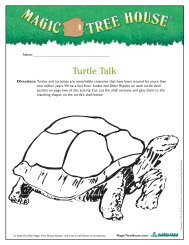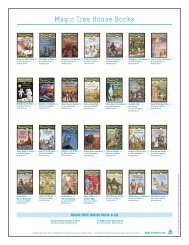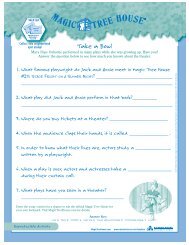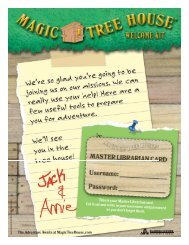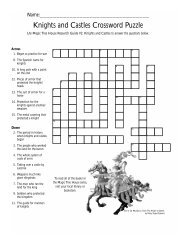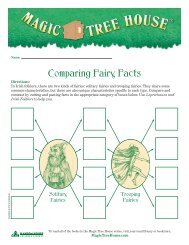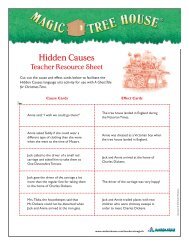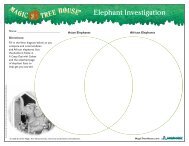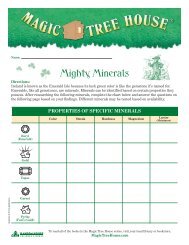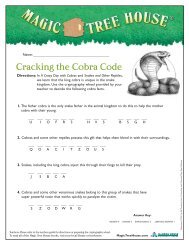You also want an ePaper? Increase the reach of your titles
YUMPU automatically turns print PDFs into web optimized ePapers that Google loves.
R<br />
FACT TRACKER<br />
<strong>Abraham</strong><br />
<strong>Lincoln</strong><br />
FACT TRACKER<br />
MTH47<br />
A NONFICTION<br />
COMPANION TO<br />
MAGIC TREE HOUSE #47:<br />
Abe <strong>Lincoln</strong><br />
at Last!<br />
Mary Pope Osborne and Natalie Pope Boyce<br />
Chapter Sample
Climb the ladder to adventure by<br />
reading<br />
books!<br />
Turn the page for a sneak peek . . .
1<br />
<strong>Abraham</strong> <strong>Lincoln</strong><br />
<strong>Abraham</strong> <strong>Lincoln</strong> was born near Hodgenville,<br />
Kentucky, on February 12, 1809. His<br />
birthplace was a one-room log cabin at Sinking<br />
Spring Farm along Nolin Creek. The<br />
cabin had one window covered with greased<br />
paper, one door hung by leather straps, and<br />
a fire burning in the fireplace. Outside, the<br />
wind blew through chinks in the logs, chilling<br />
the room and making the fire sputter.<br />
<strong>Abraham</strong> and his mother, Nancy, slept<br />
1
under bearskin blankets on a mattress<br />
made of corn husks. Nearby, his twoyear-old<br />
sister, Sarah, played on the dirt<br />
floor by the dim light of the fireplace.<br />
Thomas <strong>Lincoln</strong>, the baby’s father, told<br />
his wife he felt proud to have a son.<br />
At this time<br />
Kentucky<br />
was part of<br />
Virginia. It<br />
became a state<br />
in 1792.<br />
<strong>Abraham</strong>’s Parents<br />
Thomas <strong>Lincoln</strong> had come to Kentucky<br />
as a boy with his family in 1782. His<br />
father hoped to start a new life with a<br />
larger farm than the one they had owned<br />
in Virginia.<br />
The trip from Virginia was long, slow,<br />
and dangerous. There were few roads.<br />
Mostly there were just overgrown paths.<br />
Much of the country was wilderness<br />
where bobcats, wolves, and bears roamed<br />
the fields and forests. A horse-drawn<br />
2
wagon could cover twenty-five miles a day.<br />
Oxcarts traveled only about half of that.<br />
Like many other settlers, the <strong>Lincoln</strong>s followed<br />
the Cumberland Trail, a rough road that<br />
stretched from Kentucky to Tennessee.<br />
3
By 1790, over<br />
1,500 settlers<br />
had been<br />
killed in<br />
Kentucky.<br />
Thomas never<br />
went to school<br />
and almost<br />
never wrote<br />
more than his<br />
signature.<br />
The Shawnee, Cherokee, and other<br />
Native Americans had lived or hunted in<br />
Kentucky for thousands of years. Settlers<br />
were taking over their land and<br />
pushing them out.<br />
There was great tension between the<br />
groups. Thomas was just eight when he<br />
saw his father killed by a Shawnee war<br />
party.<br />
Thomas <strong>Lincoln</strong> was marked forever<br />
by the terror of that day. <strong>Abraham</strong> said<br />
that from then on, his father became a<br />
“wandering, laboring boy” who did odd<br />
jobs, often working as a carpenter.<br />
In 1806, Tom married a young woman<br />
named Nancy Hanks. She, too, had come<br />
from Virginia. Nancy was known for her<br />
quick mind and gentle ways. A year later,<br />
the <strong>Lincoln</strong>s had Sarah. When their son<br />
4
was born two years later, they named him<br />
<strong>Abraham</strong>, after his grandfather.<br />
Nancy’s cousin, Dennis Hanks, was only<br />
nine when he first visited the new baby.<br />
Later he said that <strong>Abraham</strong> was the smallest,<br />
most “cryin’est” baby he had ever seen.<br />
Dennis told Nancy that he didn’t think<br />
<strong>Abraham</strong> would ever be worth much. He<br />
couldn’t have known that someday this tiny,<br />
weak infant would become one of the greatest<br />
presidents in the history of the United<br />
States.<br />
Come with us to learn more<br />
about the <strong>Lincoln</strong>s’ journeys.
The United States in 1809<br />
When <strong>Abraham</strong> was born, there were only<br />
seventeen states. Other regions were called<br />
territories. They had their own governments<br />
but were not officially states. Gradually<br />
more states were added to the list.<br />
Today we have fifty.<br />
Viceroyalty of<br />
New Spain<br />
Louisiana<br />
Territory<br />
Pigeon Creek<br />
6
• •<br />
Illinois Territory<br />
New<br />
New Salem<br />
Hampshire<br />
Springfield<br />
Vermont<br />
Michigan Territory<br />
Indiana Territory<br />
Hodgenville<br />
Ohio<br />
•<br />
Kentucky<br />
•<br />
X XX XXXXXXXXXXXXXX<br />
XX X<br />
Tennessee<br />
New<br />
York<br />
Pennsylvania<br />
Virginia<br />
D.C.<br />
North<br />
Carolina<br />
South<br />
Carolina<br />
•<br />
Rhode Island<br />
Connecticut<br />
New Jersey<br />
Delaware<br />
Maryland<br />
Massachusetts<br />
Mississippi<br />
Territory<br />
Georgia<br />
West Florida<br />
(Spain)<br />
East Florida<br />
(Spain)<br />
XXXX<br />
Cumberland Trail
2<br />
The Early Years<br />
When <strong>Abraham</strong> was two, his parents moved<br />
about ten miles away to Knob Creek.<br />
Thomas worked hard, but times were<br />
tough. When his family needed meat, he<br />
grabbed his musket and headed for the<br />
nearby woods. The <strong>Lincoln</strong>s survived on<br />
deer, wild turkeys, geese, squirrels, and<br />
rabbits. <strong>Abraham</strong> said later that his family<br />
lived in “pretty pinching times.” Like many<br />
others, the <strong>Lincoln</strong>s were very poor.<br />
9
Life on Knob Creek<br />
When he was old enough, <strong>Abraham</strong> often<br />
helped his father. One Saturday, he spent<br />
the day planting pumpkins while his father<br />
planted corn. Over and over again, the boy<br />
pressed pumpkin seeds into tiny mounds of<br />
dirt. That night, a heavy rain washed away<br />
the field, seeds and all.<br />
After another downpour, Knob Creek<br />
overflowed its banks. One day, <strong>Abraham</strong><br />
and his friend Austin Gollaher decided to<br />
wade across the swollen creek. Suddenly<br />
<strong>Abraham</strong> fell and was swept away by the<br />
swirling water! Austin thought fast. He<br />
grabbed a long sycamore stick and dragged<br />
his sinking friend to safety.<br />
Buckskins and a Raccoon Cap<br />
Nancy <strong>Lincoln</strong> and little Sarah worked long<br />
hours cooking, washing, sewing, spinning,<br />
10
and weaving. In those days, there were no<br />
machines to help them.<br />
All the cooking was done in heavy iron pots<br />
over an open fire in the fireplace.<br />
11
Nancy dressed her son in a raccoon cap<br />
and a buckskin shirt and pants. <strong>Abraham</strong><br />
went barefoot most of the year. When the<br />
weather got too cold, he wore leather moccasins.<br />
He was a tall, skinny, big-eared boy who<br />
grew quickly. His pants were usually several<br />
inches above his ankles.
Blab Schools<br />
<strong>Abraham</strong>’s mother told him Bible stories,<br />
but it’s not certain whether she could<br />
read or write. There were no books or<br />
paper in the house. In those days, there<br />
were very few schools. Being unable to<br />
read was not at all unusual.<br />
Thomas <strong>Lincoln</strong> didn’t believe in education.<br />
Sometimes he did let his children<br />
go to school for a short while. Sarah held<br />
her little brother’s hand as they trudged<br />
two miles to a log cabin school with a dirt<br />
floor. Children of all ages sat on rough<br />
benches. They wrote on slate boards with<br />
chalk.<br />
Their school was called a blab school<br />
because the students said their lessons<br />
out loud. The teacher had a book or two,<br />
but these were the only books in the<br />
classroom!<br />
Blab comes<br />
from blabber,<br />
which means<br />
to talk a lot<br />
and not make<br />
much sense.<br />
13
Early school<br />
Teachers<br />
needed no<br />
training.<br />
Almost anyone<br />
who could<br />
read well<br />
could teach.<br />
Many teachers<br />
were older<br />
teenagers.<br />
After the teacher taught a lesson, the<br />
children repeated it back. The classroom<br />
was very, very noisy.<br />
In spite of this, <strong>Abraham</strong> learned<br />
to read. The rest of his life he enjoyed<br />
14
eading books, poetry, and plays aloud to<br />
others.<br />
When planting and harvest times rolled<br />
around, the classroom emptied out. The<br />
children were in the fields working. <strong>Abraham</strong><br />
spent very little time at his first<br />
school.<br />
Storytelling<br />
The <strong>Lincoln</strong>s’ cabin was within sight of<br />
the Cumberland Trail. Even though life on<br />
Knob Creek was often lonely, visitors sometimes<br />
stopped to chat.<br />
Peddlers selling pots and pans, settlers<br />
in wagons, and travelers of all kinds often<br />
passed by. The <strong>Lincoln</strong>s also saw black<br />
slaves and the white slave traders who<br />
were taking them to cities to be sold.<br />
Everyone liked to listen to Tom <strong>Lincoln</strong>.<br />
15
He was a born storyteller. <strong>Abraham</strong> sat<br />
nearby, quietly taking in every word his<br />
father said.<br />
16
Afterward he’d practice telling the stories<br />
to himself. Then he’d try them out on<br />
his friends. Like his father, <strong>Abraham</strong> became<br />
a skilled storyteller and mimic. People<br />
loved to listen to him as he spun his<br />
tales. This skill came in very handy when<br />
he grew up and made speeches.<br />
Off to Indiana<br />
When <strong>Abraham</strong> was seven, Thomas decided<br />
to make a fresh start somewhere else.<br />
Problems had arisen about the ownership<br />
of his property. Thomas left to scout out<br />
land in the new state of Indiana. It was fall,<br />
and the winds were beginning to whip. A<br />
bad winter was coming. When Tom got<br />
back, the family packed up. They were<br />
moving to a settlement in Indiana called<br />
Pigeon Creek.<br />
17
Life in a Log Cabin<br />
Shovel for spreading ashes<br />
Handmade bed with<br />
corn-husk mattress<br />
Chest for family’s<br />
few clothes<br />
Packeddirt<br />
floor<br />
Twig broom
Rifle for hunting and defense<br />
Dishwashing pan<br />
Cast-iron pot<br />
Water<br />
bucket
Photographs courtesy of:<br />
© blickwinkel/Alamy (p. 35). © Eliot Cohen (p. 26).<br />
© CORBIS (p. 64). © Stephen de las Heras (p. 105).<br />
© Everett Collection Inc./Alamy (p. 23). Courtesy Everett<br />
Collection (pp. 83 bottom, 90, 100). © David R. Frazier<br />
Photolibrary, Inc./Alamy (p. 68). © The Granger<br />
Collection, New York (pp. 41, 67 left, 67 right, 81, 83 top,<br />
96, 97, 103). © Illustrated London News Ltd./Mary<br />
Evans (p. 88). © ImageState RM/www.fotosearch.com<br />
(pp. 94–95). Courtesy Library of Congress (front cover,<br />
p. 91). © The New York Public Library/Art Resource, NY<br />
(p. 101). © North Wind Picture Archives (p. 15). © The<br />
Print Collector/Alamy (p. 72). © Spring Images/Alamy<br />
(p. 86). © Time & Life Pictures/Getty Images (p. 58).<br />
© Universal Images Group Limited/Alamy (p. 73).
TEXT COPYRIGHT © 2011 BY MARY POPE OSBORNE AND NATALIE POPE BOYCE<br />
ILLUSTRATIONS COPYRIGHT © 2011 BY SAL MURDOCCA<br />
COVER PHOTOGRAPH COURTESY OF THE LIBRARY OF CONGRESS<br />
ALL RIGHTS RESERVED. PUBLISHED IN THE UNITED STATES BY RANDOM HOUSE<br />
CHILDREN’S BOOKS, A DIVISION OF RANDOM HOUSE, INC., NEW YORK.<br />
RANDOM HOUSE AND THE COLOPHON ARE REGISTERED TRADEMARKS AND A STEPPING<br />
STONE BOOK AND THE COLOPHON ARE TRADEMARKS OF RANDOM HOUSE, INC. MAGIC<br />
TREE HOUSE IS A REGISTERED TRADEMARK OF MARY POPE OSBORNE; USED UNDER<br />
LICENSE.<br />
THE MAGIC TREE HOUSE FACT TRACKER SERIES WAS FORMERLY KNOWN AS THE<br />
MAGIC TREE HOUSE RESEARCH GUIDE SERIES.<br />
VISIT US ON THE WEB!<br />
MAGICTREEHOUSE.COM<br />
RANDOMHOUSE.COM/KIDS<br />
EDUCATORS AND LIBRARIANS, FOR A VARIETY OF TEACHING TOOLS, VISIT US AT<br />
RANDOMHOUSE.COM/TEACHERS<br />
LIBRARY OF CONGRESS CATALOGING-IN-PUBLICATION DATA<br />
OSBORNE, MARY POPE.<br />
ABRAHAM LINCOLN / BY MARY POPE OSBORNE AND NATALIE POPE BOYCE ;<br />
ILLUSTRATED BY SAL MURDOCCA.<br />
P. CM. — (MAGIC TREE HOUSE FACT TRACKER)<br />
“A NONFICTION COMPANION TO MAGIC TREE HOUSE, #47: ABE LINCOLN AT LAST!”<br />
“A STEPPING STONE BOOK.”<br />
ISBN 978-0-375-87024-8 (TRADE) — ISBN 978-0-375-97024-5 (LIB. BDG.) —<br />
ISBN 978-0-375-98861-5 (EBOOK)<br />
1. LINCOLN, ABRAHAM, 1809–1865—JUVENILE LITERATURE. 2. PRESIDENTS—UNIT-<br />
ED STATES—BIOGRAPHY—JUVENILE LITERATURE. I. BOYCE, NATALIE POPE. II.<br />
MURDOCCA, SAL, ILL. III. TITLE.<br />
E457.905.O77 2011 973.7092—DC22 [B] 2011013116<br />
PRINTED IN THE UNITED STATES OF AMERICA<br />
10 9 8 7 6 5 4 3 2 1<br />
RANDOM HOUSE CHILDREN’S BOOKS SUPPORTS THE FIRST AMENDMENT<br />
AND CELEBRATES THE RIGHT TO READ.<br />
ATTENTION READER:<br />
EXCERPT ONLY—NOT FOR SALE
About the Author<br />
Photo credit: Virginia Berbrich<br />
Mary Pope Osborne and Natalie Pope Boyce<br />
are sisters who grew up on army posts all over<br />
the world. They are working on more <strong>Magic</strong><br />
<strong>Tree</strong> <strong>House</strong> ® Fact Tracker books to give <strong>Magic</strong><br />
<strong>Tree</strong> <strong>House</strong> readers facts and information<br />
about places, time periods, and animals that<br />
Jack and Annie discover in the <strong>Magic</strong> <strong>Tree</strong><br />
<strong>House</strong> adventures.<br />
Mary lives in Connecticut. Natalie makes<br />
her home nearby in the Berkshire Hills of<br />
Massachusetts. Mary is the author of all the<br />
<strong>Magic</strong> <strong>Tree</strong> <strong>House</strong> fiction titles as well as many<br />
more books for kids.



